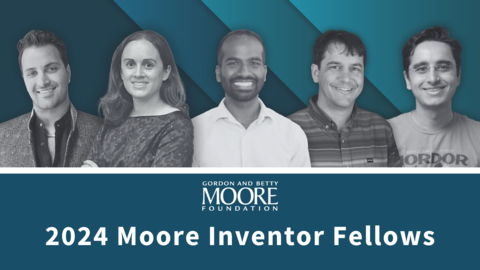Moore Foundation awards more than $4 million to advance the ideas and innovations of five scientist-inventors
The Gordon and Betty Moore Foundation selected five aspiring inventors as the ninth cohort of Moore Inventor Fellows. This fellowship champions scientist-inventors who design groundbreaking tools and technologies — creative people poised to make substantial strides in scientific discovery, environmental conservation and patient care.
This press release features multimedia. View the full release here: https://www.businesswire.com/news/home/20240918129624/en/

2024 Moore Inventor Fellows (Graphic: Business Wire)
“The Moore Inventor Fellowship celebrates the ingenuity and creativity needed to meet today's challenges and shape a better future,” said Harvey V. Fineberg, M.D., Ph.D., president of the Gordon and Betty Moore Foundation. “We are proud to support these visionaries early in their careers as they develop technologies that can make a significant and positive impact on critical issues facing the world and its occupants.”
Curiosity and a passion for discovery
This year’s cohort display bold curiosity and a passion for applying science to better our world.
The work proposed by these five scientist-inventors will:
- Invent a technology that could bring modern, point-of-care medical diagnostics to remote and under-resourced areas of our planet.
- Build ultra-thin oscillators that could advance telecommunications and medical imaging.
- Invent technology that can image the ocean floor in much the same way telescopes image the cosmos.
- Develop electrically powered catalysts to synthesize epoxides — that will uncover a path to safe and sustainable chemical synthesis.
- Observe the motors that walk on DNA and RNA – and learn how they turn chemical energy into physical motion.
“We hope these grants will embolden our scientist fellows to take risks while working to develop their inventions,” said Adam Jones, Ph.D., Science program officer. “We’re thrilled to support these fellows as they embark on their entrepreneurial journeys.”
This year’s five fellows were selected from nearly 200 applications. Each scientist-inventor receives a total of $825,000 over three years to drive their invention forward, which includes $50,000 per year from their home institution as a commitment to these outstanding individuals.
A funding program honoring Moore Foundation founder, Gordon Moore
The fellowship was launched in 2016 to commemorate the 50th anniversary of Moore’s Law, the groundbreaking prediction of exponential growth in computing power. The Moore Inventor Fellows program honors and embodies Gordon Moore’s enthusiasm for science and innovation. The foundation committed nearly $34 million by 2026 to support 50 Moore Inventor Fellows, selecting five fellows each year for 10 years, beginning in 2016. The aim is for these fellows to drive discoveries and advancements that will propel progress over the next 50 years.
Nominations for 2025 Moore Inventor Fellows
Nominations for 2025 Moore Inventor Fellows, tenth cohort, are being solicited from eligible institutions until November 15, 2024. Institutional representatives are also invited to join a virtual Q&A on October 10, 2024 from 10:00-11:00 a.m. Pacific Time. To gain access to the application system, please complete the 2025 contact form ahead of the nomination submission deadline.
More information is available at moore.org/inventors.
2024 Moore Inventor Fellows
Saad Bhamla, Ph.D., Associate Professor of Chemical and Biomolecular Engineering, Georgia Institute of Technology (LinkedIn)
Dr. Bhamla's frugal inventions could bring point-of-care diagnostics and modern medical tests to billions of people in remote and under-resourced areas of our planet.
Ved Chirayath, Ph.D., National Geographic Explorer; Vetlesen Professor of Earth Sciences and Aeronautical Engineering, University of Miami (LinkedIn)
Dr. Chirayath’s technology would allow for imaging through ocean waves to see marine wildlife, seafloor, and marine plastics from aircraft – and future spacecraft – much like telescopes observe the distant universe through our turbulent atmosphere.
Andrew Laszlo, Ph.D., Research Assistant Professor, Department of Physics, University of Washington (LinkedIn)
Dr. Laszlo’s invention of nanopore tweezers presents broad therapeutic potential through a new single-molecule technique – capable of resolving the fundamental steps taken by helicases and polymerases in current drug-screening methods that lack the microscopic detail needed to determine how candidate drugs actually work.
Karthish Manthiram, Ph.D., Professor of Chemical Engineering and Chemistry; William H. Hurt Scholar, California Institute of Technology (LinkedIn)
Dr. Manthiram’s group will undertake efforts to develop electrically powered catalysts to synthesize epoxides. This could eliminate the safety hazards and carbon footprint incurred in today’s epoxide manufacturing, providing a pathway to sustainable and safe chemical synthesis.
Julia Mundy, Ph.D., John L. Loeb Associate Professor of the Natural Sciences and of Engineering and Applied Sciences, Harvard University (LinkedIn)
Dr. Mundy’s invention will develop new, ultra-thin oscillators for electronic applications, potentially leading to advances in telecommunications and medical imaging.
View source version on businesswire.com: https://www.businesswire.com/news/home/20240918129624/en/
Contacts
Trity Pourbahrami, Communications Officer, Gordon and Betty Moore Foundation, trityp@moore.org, (626) 298-5533













